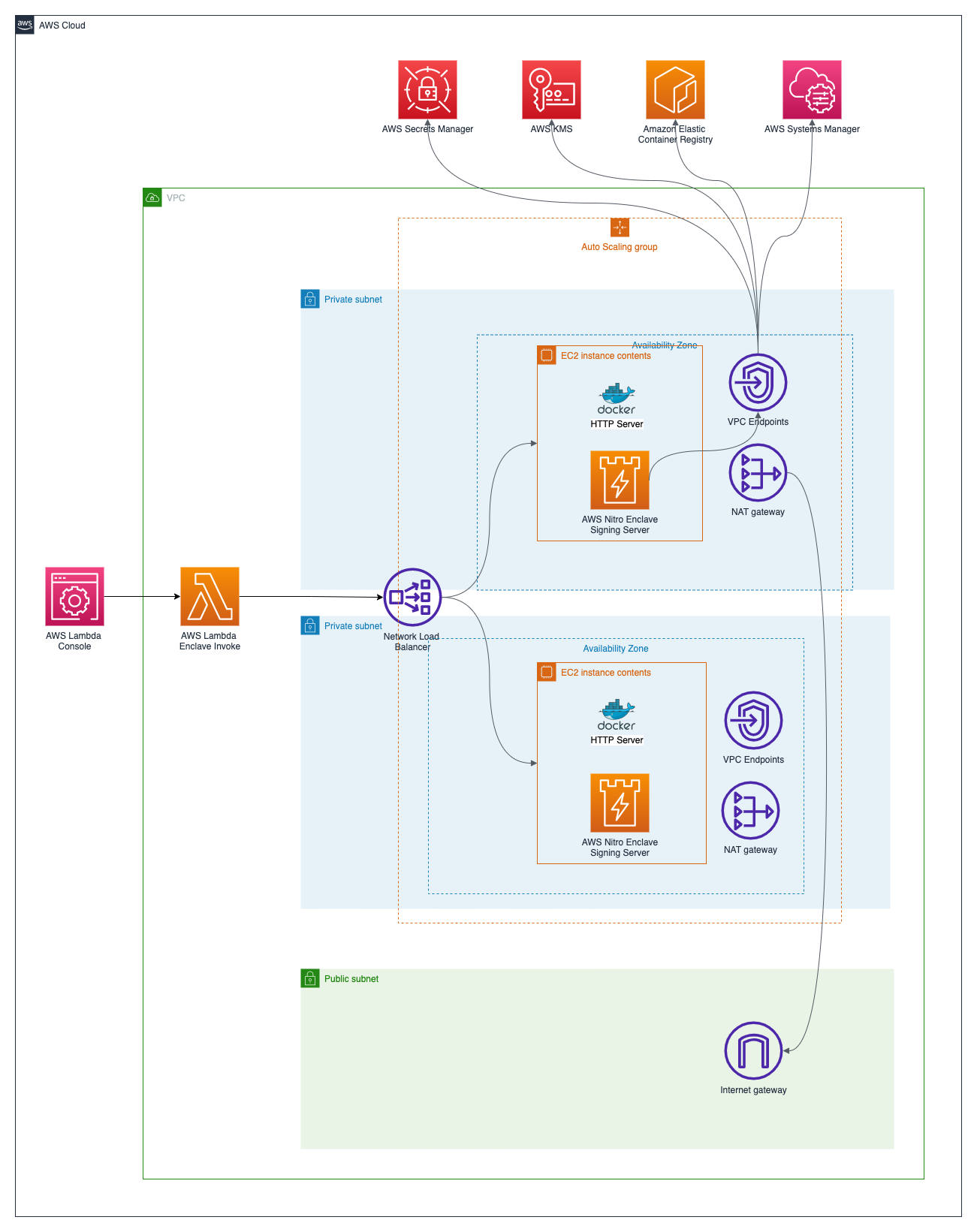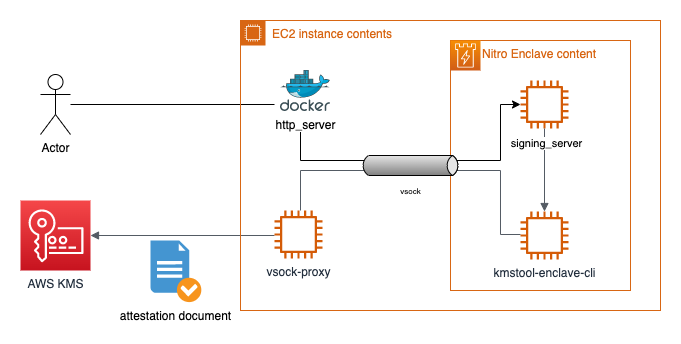This project represents an example implementation of an AWS Nitro Enclave based blockchain account management solution a.k.a. a wallet. It's implemented in AWS Cloud Development Kit (CDK) v2 and Python.
This repository contains all code artifacts for the following three blog posts:
- AWS Nitro Enclaves for secure blockchain key management: Part 1
- AWS Nitro Enclaves for secure blockchain key management: Part 2
- AWS Nitro Enclaves for secure blockchain key management: Part 3
For an overview of how to design an AWS Nitro Enclave based blockchain application please have a look at the first blog post.
For a walk-through of how to deploy and configure the Nitro Enclave based blockchain key management solution please refer to the second blog post.
For a deep dive into Nitro Enclaves and the explanation of features like cryptographic attestation and additional information about the general architecture of a Nitro Enclaves-based Ethereum signing application please refer to third blog post.
Deploying the solution with the AWS CDK The AWS CDK is an open-source framework for defining and provisioning cloud application resources. It uses common programming languages such as JavaScript, C#, and Python. The AWS CDK command line interface (CLI) allows you to interact with CDK applications. It provides features like synthesizing AWS CloudFormation templates, confirming the security changes, and deploying applications.
This section shows how to prepare the environment for running CDK and the sample code. For this walkthrough, you must have the following prerequisites:
- An AWS account.
- An IAM user with administrator access
- Configured AWS credentials
- Installed Node.js, Python 3, and pip. To install the example application:
When working with Python, it’s good practice to use venv to
create project-specific virtual environments. The use of venv also reflects AWS CDK standard behavior. You can find
out more in the
workshop Activating the virtualenv.
-
Install the CDK and test the CDK CLI:
npm install -g aws-cdk && cdk --version -
Download the code from the GitHub repo and switch in the new directory:
git clone https://github.com/aws-samples/aws-nitro-enclave-blockchain-wallet.git && cd aws-nitro-enclaves-blockchain-wallet
-
Install the dependencies using the Python package manager:
pip install -r requirements.txt
-
Deploy the example code with the CDK CLI:
cdk deploy devNitroWalletEth
{
"Version": "2012-10-17",
"Statement": [
{
"Sid": "Enable decrypt from enclave",
"Effect": "Allow",
"Principal": {
"AWS": <devNitroWalletEth.EC2InstanceRoleARN>
},
"Action": "kms:Decrypt",
"Resource": "*",
"Condition": {
"StringEqualsIgnoreCase": {
"kms:RecipientAttestation:ImageSha384": <PCR0_VALUE_FROM_EIF_BUILD>
}
}
},
{
"Sid": "Enable encrypt from lambda",
"Effect": "Allow",
"Principal": {
"AWS": <devNitroWalletEth.LambdaExecutionRoleARN>
},
"Action": "kms:Encrypt",
"Resource": "*"
},
{
"Effect": "Allow",
"Principal": {
"AWS": <KMS_ADMINISTRATOR_ROLE_ARN>
},
"Action": [
"kms:Create*",
"kms:Describe*",
"kms:Enable*",
"kms:List*",
"kms:Put*",
"kms:Update*",
"kms:Revoke*",
"kms:Disable*",
"kms:Get*",
"kms:Delete*",
"kms:ScheduleKeyDeletion",
"kms:CancelKeyDeletion",
"kms:GenerateDataKey",
"kms:TagResource",
"kms:UntagResource"
],
"Resource": "*"
}
]
}To leverage the provided generate_key_policy.sh script, a CDK output file needs to be provided.
This file can be created by running the following command:
cdk deploy devNitroWalletEth -O output.jsonAfter the output.json file has been created, the following command can be used to create the KMS key policy:
./script/generate_key_policy.sh ./output.jsonUse the command below to create a temporary Ethereum private key.
openssl ecparam -name secp256k1 -genkey -noout | openssl ec -text -noout > key
cat key | grep priv -A 3 | tail -n +2 | tr -d '\n[:space:]:' | sed 's/^00//'Use the following command to calculate the corresponding public address for your temporary Ethereum key created in the previous step. keccak-256sum binary needs to be made available to execute the calculation step successfully.
cat key | grep pub -A 5 | tail -n +2 | tr -d '\n[:space:]:' | sed 's/^04//' > pub
echo "0x$(cat pub | keccak-256sum -x -l | tr -d ' -' | tail -c 41)"Please be aware that the calculated public address does not comply with the valid mixed-case checksum encoding standard for Ethereum addresses specified in EIP-55.
Replace the Ethereum key placeholder in the JSON request below and use the request to encrypt and store the Ethereum key
via the Lambda test console:
{
"operation": "set_key",
"eth_key": <ethereum_key_placeholder>
}Use the request below to sign an Ethereum EIP-1559 transaction with the saved Ethereum key using the Labda test
console:
{
"operation": "sign_transaction",
"transaction_payload": {
"value": 0.01,
"to": "0xa5D3241A1591061F2a4bB69CA0215F66520E67cf",
"nonce": 0,
"type": 2,
"chainId": 4,
"gas": 100000,
"maxFeePerGas": 100000000000,
"maxPriorityFeePerGas": 3000000000
}
}Once you have completed the deployment and tested the application, clean up the environment to avoid incurring extra cost. This command removes all resources in this stack provisioned by the CDK:
cdk destroySee CONTRIBUTING for more information.
This library is licensed under the MIT-0 License. See the LICENSE file.

